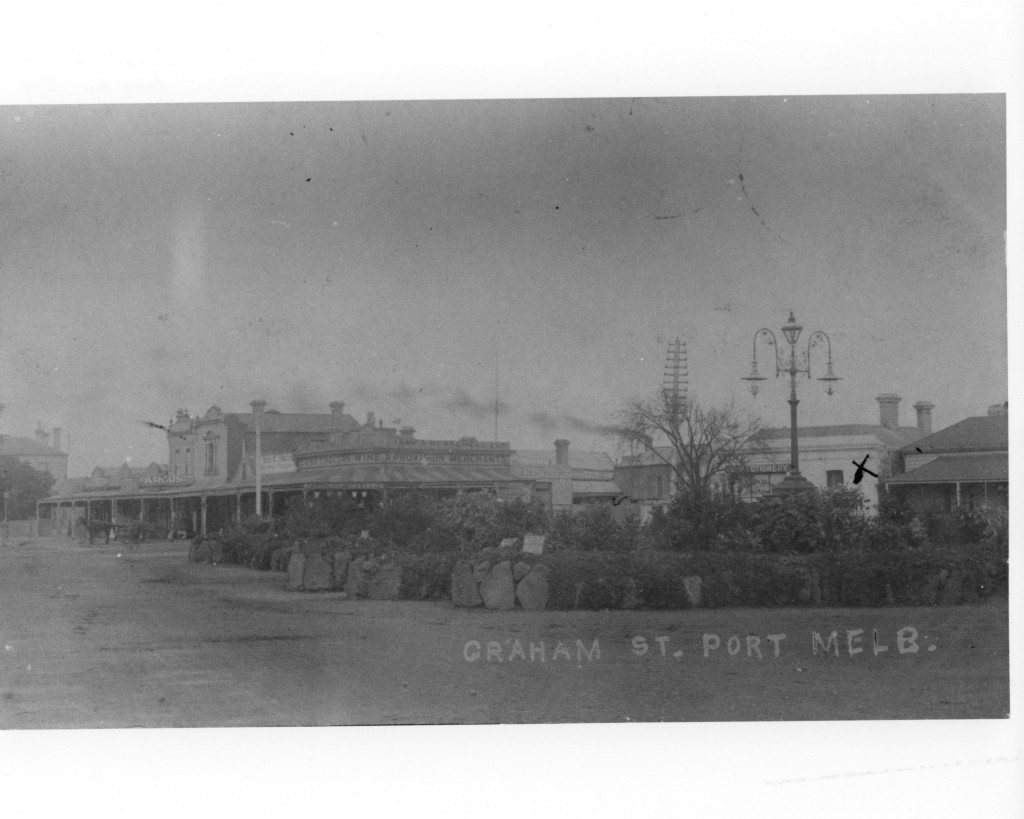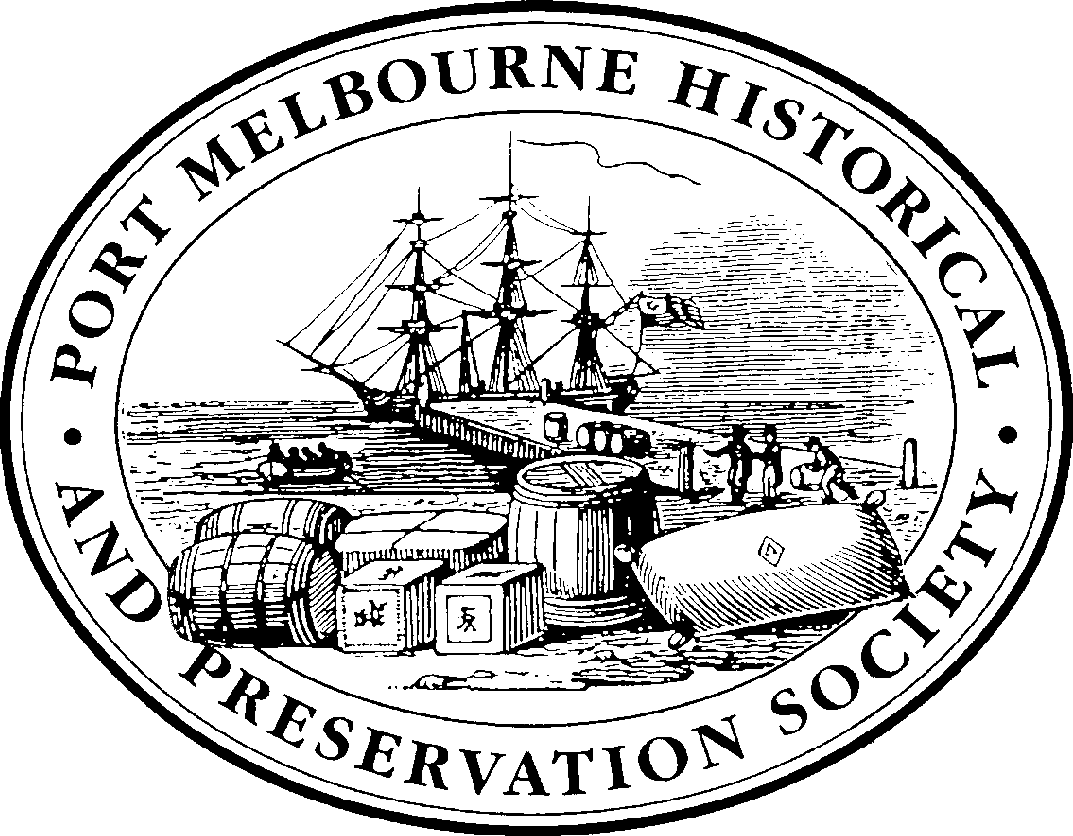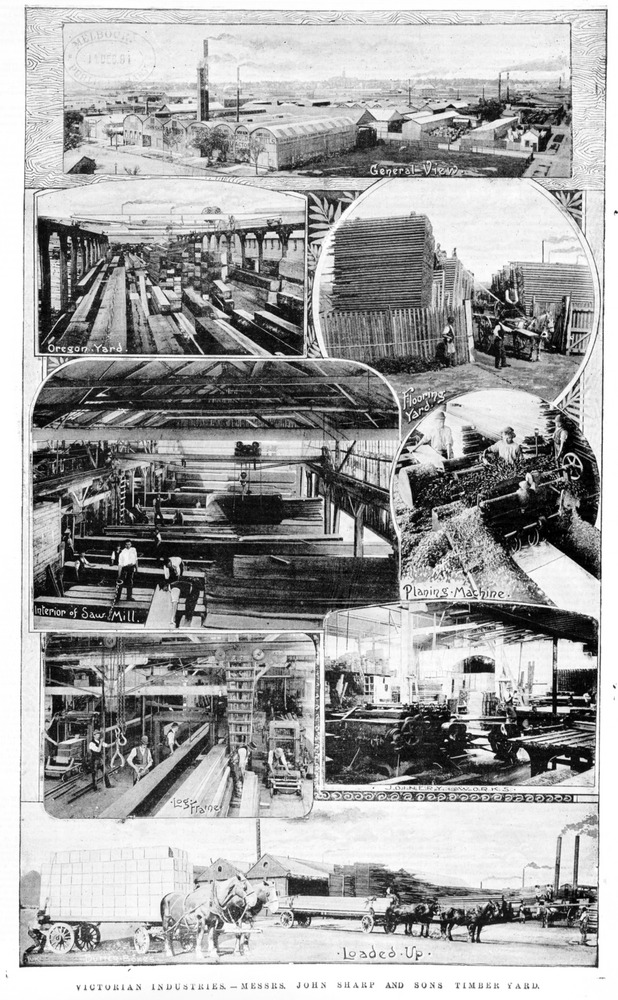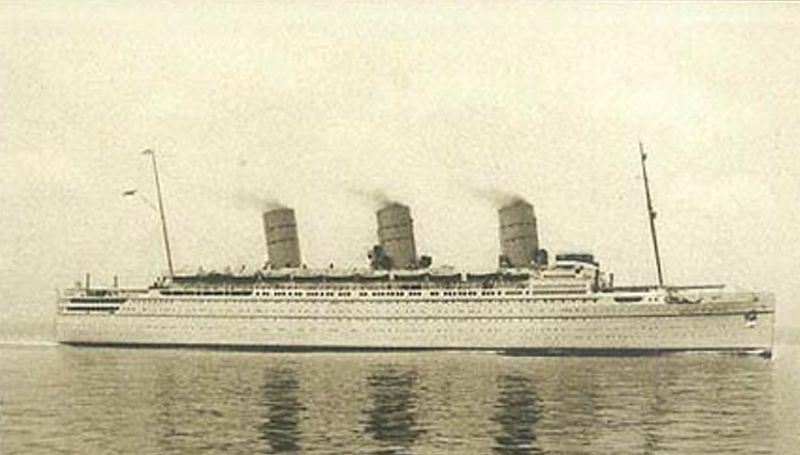The Graham Street Rockeries
This is the briefest beginning of stories associated with the Graham St overpass.
Before the West Gate Bridge was built, access to the other side of the river at Newport was via a ferry at the end of Williamstown Road. The Graham Street overpass was built in the late 1970s in anticipation of the growing number of cars that would pass through Port Melbourne when the Bridge opened.
Graham was an extremely busy station at that time with freight and passenger trains leaving the railway gates closed for extended periods causing frustrating delays. Shunting caused even more exasperation. The overpass allowed the railway to continue to operate without interruption while traffic flowed across the top.
The construction of the overpass involved the demolition of a small community of shops, the Foresters Arms hotel and the rockeries – a gathering place. The Maskell and McNab memorial – now on the foreshore – was also located here, near the railway – in the service of which those men died.

It would be wonderful to hear your memories of that Williamstown ferry or if you recall life in Graham St before the overpass went in.
Sources and further references:
Grainger, P 2003 Railway Rockeries: Tales of the Melbourne and Hobson’s Bay Railway Reserves, Port Melbourne Port Melbourne Vic: Port Melbourne Historical and Preservation Society



16 Comments
Pamela
I went to Graham Street Primary,i remember alway’s useing the underpass,going through the gates to cross,the guy’s shutting gate;s for train’s,the good old day’s
Janet Bolitho
Thanks for the memory!
Nicolas Hermence
Hi Janet,
I lived in the Station Street Housing commission flats when the bridge was built,
there were boom gates there and a horse trough on the right just before the park and the entrance to Graham Street Station.
The last draw horse carts used to remove rubbish from the streets of Port Melbourne which stopped operating in 1972.This Trough was one of the stops where the horses use to drink at.
There was a group of shops in Graham Street that was demolished and I can remember frolicking in the Shoe repair shop when it was demolished. I brought some old shoe trinkets home and my mum made me take them back.
We played on the site and were forever being told to get off, when they started to tar the road we got up on the bridge on skateboards and bikes, only to be reprimanded to get off.
It was a huge event in a child’s life. I also attended St Joseph’s Port Melbourne with Robert Bradley.
regards, Nicolas Hermence
Janet Bolitho
Hi Nicolas
Sounds like you had a lot of fun! I am so interested in that period when the overpass went in. I wonder how long it took to build? They must also have needed to dismantle/demolish those station buildings. Your memories most gladly received.
Janet
Paula
I came across this site as i was looking for information about the construction of the Graham Street bridge. My father is turning 80 and we are putting together a memory book for him. To this day every time we pass over or under the bridge he reminds me that he built that bridge. Makes me smile every time i pass it.
David Thompson
Hi Paula,
Thanks for visiting. It’s great that you have such a concrete connection to Port Melbourne … sorry that was very bad! Your comment raises so many questions. What is your father’s name? What was his role in the construction of the overpass? Are you still looking for information about that part of Port?
Reg Macey
Janet..On the opposite side of the Graham Street Railway gates from the group of shops and hotel you mentioned were a group of single fronted wooden homes that were compulsorily acquired and demolished. I can picture at least four….but I think more were involved.
Janet Bolitho
Thank you Reg. It’s too easy to forget that houses and the people who lived in them had to make way for the overpass.
Russell Cox
My father would drive the car onto the punt to get to Williamstown. He would let me get out of the car. I was scared of the deep water but I could see the chain just below. It was cold and the chains and engine would rattle as we crossed the water. Dad said drunks would drive straight into the river after the punt had closed for the night. I was about 11 years old in 1968.
David Thompson
Thanks Russell
Russell Cox
Dad worked at Lever and Kitchen in Ingles Street in the office which was featured in the “The Block” he met my mother there in the office. He worked for Unilever his entire working life. He loved Port Melbourne. We couldn’t live there though. Then it wasn’t a very diserable location for a family
David Thompson
Thanks Russell, great memories.
steven kelly
Hi
I’m the builder who is constructing the new skatepark underneath the overpass, and I’m trying to figure out what was there beforehand as I’m finding concrete slab upon concrete slab during demolition, I think we have uncovered atleast 4 layers of concrete so far, do you know what was originally there on the corner of Swallow and Station St?
David Thompson
Most interesting Steve!
The area under the Graham Street overpass had a notorious double set of railway gates which were constantly being closed so trains could access the railway yards on the bay side of Graham Street causing long delays for cars on Graham street. They were affectionately known locally as “Grahamy Gates”.
The overpass was built in the early 1970s with the demolition of some nearby houses, shops, a hotel and the Graham Street Rockeries. I don’t think any of these would have been constructed using large amounts of concrete.
Albert Caton
The north side of Graham Street to the west of the railway had (perhaps missing some places):
A narrow railway reserve park;
Evans Street;
A double-fronted house (?);
McCarthy’s Milk Bar;
A barber shop (also McCarthy’s ?);
The Clare Castle Hotel (with a horse trough at the roadside so that beer-delivery Clydesdales could drink);
Ross Street (which crossed Graham Street at the time);
The Hibernian Hotel;
Leo O‘Hearn’s Chemist shop;
A butcher (whose name I forget);
Three or four private houses, the two near Albert Street occupied by the Farkotovas (she had long blond hair, and intense make-up) and then Len and Mrs Wheate;
Our corner store on the Albert Street corner (owned pre-1952 by the Sayers, and post-1958 by the Munroes).
On the south side of Graham Street after Swallow Street there was a public reserve with tennis courts; an odiferous brick public lavatory; and at the southern area a playground with two swings, a tall metal slide, a horizontal back-and-forth swing plank, and a two/board set of see-saws.
Across Ross Street there was a row of private houses along to the Albert Street corner (which had a small, closed shop).
My recollection of shops, etc., east of the railway line is more vague. On the north of the Station Street corner was a Milk Bar (was it known, like the rail gates, as the Grahamy Gates milk bar?)
On the south side was a small garden reserve, and across the short road south of it, Peter’s Fish Shop. The rest are a blur.
Albert Caton
The curve of Swallow Street around south west from Graham Street between Barry’s wood yard and the tennis courts reserve was concrete paved (and made my billycart’s tiny ball-bearing wheels scream); might it be the source of the concrete?
Graham Street at the railway line had two sets of road gates for the freight line and the (adjacent to the east) passenger line; a separate set of pedestrian-crossing gates, likewise lockable from the signal box; and a subway across from the Evans Street side to Station Street side (with access up to the Melbourne-side platform; there was no access to the Port-side platform, which just had a curved ramp down to the footpath at the top of the subway).